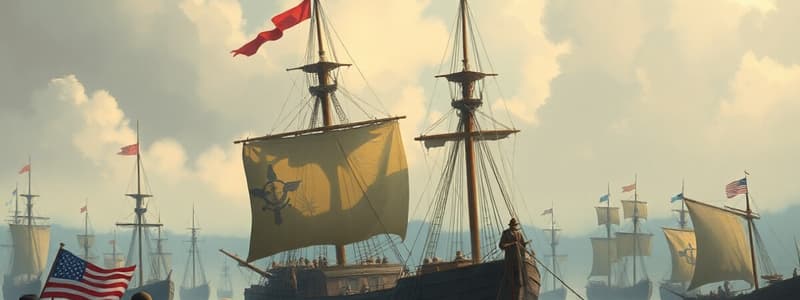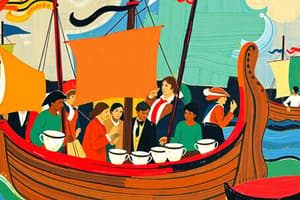Podcast
Questions and Answers
Explain how the Tea Act of 1773 created a monopoly, and what impact did this have on colonial merchants?
Explain how the Tea Act of 1773 created a monopoly, and what impact did this have on colonial merchants?
The Act granted the East India Company exclusive rights to sell tea in the colonies, cutting colonial merchants out of the tea trade and eliminating competition.
Describe the symbolic importance of the colonists dressing as Mohawk tribe members during the Boston Tea Party. What message were they trying to convey?
Describe the symbolic importance of the colonists dressing as Mohawk tribe members during the Boston Tea Party. What message were they trying to convey?
By dressing as Mohawk tribe members, the colonists were symbolically rejecting British authority and identifying themselves with those who were native to the land and free from British control. It was a visual statement of defiance.
What were the main consequences of the Coercive Acts, and how did these acts contribute to uniting the colonies against British rule?
What were the main consequences of the Coercive Acts, and how did these acts contribute to uniting the colonies against British rule?
The Coercive Acts closed Boston's port, restricted town mettings, and allowed quartering of British troops. These punitive measures fostered shared grievances and galvanized intercolonial cooperation against British oppression.
How did the actions of the First Continental Congress demonstrate a shift in the colonists' attitude toward British rule, and what specific actions did they take to challenge British authority?
How did the actions of the First Continental Congress demonstrate a shift in the colonists' attitude toward British rule, and what specific actions did they take to challenge British authority?
Compare and contrast the objectives of the British forces and the colonial Minutemen at Lexington and Concord. What were their ultimate goals at the start of the conflict?
Compare and contrast the objectives of the British forces and the colonial Minutemen at Lexington and Concord. What were their ultimate goals at the start of the conflict?
Explain the strategic significance of Breed's Hill (often referred to as Bunker Hill) in the early stages of the Revolutionary War.
Explain the strategic significance of Breed's Hill (often referred to as Bunker Hill) in the early stages of the Revolutionary War.
How did the formation of the Continental Army represent a significant step toward colonial unity and independence?
How did the formation of the Continental Army represent a significant step toward colonial unity and independence?
What was the intended purpose of the Olive Branch Petition, and why did it ultimately fail to prevent further conflict between the colonies and Britain?
What was the intended purpose of the Olive Branch Petition, and why did it ultimately fail to prevent further conflict between the colonies and Britain?
What were the key differences in opinion among delegates at the Second Continental Congress regarding the appropriate course of action to take in response to British policies?
What were the key differences in opinion among delegates at the Second Continental Congress regarding the appropriate course of action to take in response to British policies?
Describe the steps taken by the colonists to prepare for war with Britain prior to the Declaration of Independence. Include both political and military preparations.
Describe the steps taken by the colonists to prepare for war with Britain prior to the Declaration of Independence. Include both political and military preparations.
Flashcards
Legal Monopoly
Legal Monopoly
Complete control of a good or service in an area by one person or group, including pricing.
The Tea Act
The Tea Act
An act passed in 1773 that gave the East India Company a monopoly on tea sales to the colonies.
Boycott
Boycott
To refuse to buy goods or services as a form of protest.
Boston Tea Party
Boston Tea Party
Signup and view all the flashcards
Coercive/Intolerable Acts
Coercive/Intolerable Acts
Signup and view all the flashcards
Blockade
Blockade
Signup and view all the flashcards
Quartering Act
Quartering Act
Signup and view all the flashcards
First Continental Congress
First Continental Congress
Signup and view all the flashcards
Minutemen
Minutemen
Signup and view all the flashcards
Olive Branch Petition
Olive Branch Petition
Signup and view all the flashcards
Study Notes
- In 1773, Parliament enacted the Tea Act.
- The Tea Act granted a tea monopoly to Britain's East India Company.
- A legal monopoly gives complete control of a product or service, including pricing and competition, to a single entity.
- Only the East India Company was permitted to sell tea to the colonies.
The Colonists Boycott Tea
- The Tea Act forced colonists to purchase tea exclusively from the East India Company.
- Colonists could choose to pay the tea tax or abstain from drinking tea.
- Many colonists chose to boycott tea, and some made tea from sassafras trees.
- Three ships carrying thousands of pounds of tea sailed for the colonies.
- In late November 1773, the ships arrived in Boston.
- The Massachusetts governor allowed the ships to dock, despite opposition from many colonists.
Violence Erupts in Boston Harbor
- It's speculated that Samuel Adams orchestrated the events that followed.
- On December 16, 1773, approximately 150 members of the Sons of Liberty, disguised as Mohawk Native Americans, marched to Boston Harbor.
- Hundreds of spectators gathered at the harbor.
- The Sons of Liberty boarded the ships, broke open >300 chests of tea, and dumped the contents into the harbor.
- The event was an angry protest, and became known as the Boston Tea Party.
- The colonists who took part in the Boston Tea Party refused to pay for the tea they had destroyed.
The Coercive Acts
- The Boston Tea Party angered British leaders.
- In March 1774, Parliament passed the Coercive Acts to punish Massachusetts colonists, they coerced or forced colonists to follow laws viewed as unfair.
Punishing the Colonies
- One Coercive Act closed the port of Boston until colonists paid for the destroyed tea.
- Parliament ordered the British navy to blockade Boston Harbor to enforce this.
- British warships blockaded Boston Harbor by stopping ships from entering or leaving.
- Britain stopped the Massachusetts legislature from meeting and placed the colony under British General Thomas Gage's control.
- All town meetings required approval from General Gage.
- Colonists were ordered to quarter British soldiers, which meant they were forced to provide food and housing.
- Colonists found the new laws "intolerable," leading the Coercive Acts to also be known as the Intolerable Acts.
- These laws united colonists against Britain.
- Edmund Burke spoke to Parliament in April 1774, questioning the use of force to make colonists buy taxed goods.
- Parliament ignored Burke's call for cooperation.
Road to War
- December 1773: The Boston Tea Party happens.
- September 1774: The First Continental Congress meets at Carpenters' Hall in Philadelphia.
- April 1775: British and colonial forces clash at Lexington and Concord.
The First Continental Congress
- Some in Britain like William Pitt worried about the trouble in the colonies, and said that British leaders needed to be more patient.
- In September 1774, colonial leaders convened in Philadelphia and became known as the First Continental Congress.
- The Congress then addressed a signed request to King George III.
- The petition asserted the colonists' rights as British citizens, including the rights to life, liberty, assembly, and trial by jury.
- Congress set a deadline of May 10, 1775, for Parliament to respond.
- Congress voted to cease trade with Britain and urged the colonies to organize militias.
Lexington and Concord
- Colonists in Massachusetts formed militia units called Minutemen.
- They were called this because they were said to be ready to fight at a minute's notice.
The British Take Action
- In April 1775, General Gage learned Samuel Adams and John Hancock were in Lexington and that Minutemen stored weapons in nearby Concord.
- Gage dispatched over 700 British soldiers to Lexington and Concord to arrest the leaders of the Sons of Liberty and seize the weapons.
- Paul Revere learned about the British plan; and rode to Lexington to warn Adams, Hancock, and the townspeople.
- When the British arrived in Lexington, the Minutemen were waiting and John Parker, the leader of the Minutemen, told them not to fire unless fired upon, but to let war begin.
- Shots were fired, killing eight Minutemen and wounding several others.
- The British marched to Concord to seize weapons, but they were already moved.
The Second Continental Congress
- News of the fighting at Lexington and Concord spread.
- Colonial leaders called for the Second Continental Congress to meet in Philadelphia on May 10, 1775.
- The delegates met at the Pennsylvania State House (Independence Hall).
- The delegates were divided on whether to wage war against the British.
- By June, Congress agreed to prepare for war.
Preparing for War
- The first step was for Congress to form an army, called the Continental Army.
- Unlike the part-time militias that each of the 13 colonies already had, the Continental Army was mostly made up of full-time soldiers.
- George Washington was chosen as the commander in chief, the leader of all the military forces, on the suggestion of John Adams of Massachusetts.
- Adams wanted Washington because he had served in the French and Indian War, and he believed that Washington understood soldiers and knew how to fight a war.
- Congress asked each colony to provide money for guns, food, and uniforms.
- The Continental Congress printed its own paper money, Continental currency, and paid the soldiers in Continentals.
The Battle of Bunker Hill
- By the time George Washington was chosen to lead the new Continental Army, the first major battle of the Revolutionary War had already been fought and took place on June 17, 1775.
The Battle Begins
- After sunset on June 16, colonial commanders Israel Putnam and William Prescott arrived at Breed's Hill across the Charles River from Boston.
- They ordered their soldiers to build earthworks, (walls of earth and stone), as a defensive measure.
- Upon learning this, British General Thomas Gage sent General William Howe with 2,400 British troops to capture Breed's Hill.
- As the British approached, the 1,600 colonists started shooting from behind the earthworks and Putnam ordered soldiers to save bullets.
- Putnam shouted, "Don't fire until you see the whites of their eyes.”
A Fierce Fight
- Facing intense fighting on the hill, the British were forced to retreat twice.
- Thousands in Boston watched Charlestown hit and set on fire by cannons.
- The colonists ran out of ammunition, the British overtook the earthworks, causing the colonists to retreat.
- The British captured Breed's Hill.
- The battle was mistakenly named for nearby Bunker Hill.
- The British won, but suffered heavy losses of >1,000 soldiers killed or wounded, while about 350 colonists were killed or wounded.
Trying for Peace
- The British realized fighting the colonists would not be easy, despite their victory at Bunker Hill.
The Olive Branch Petition
- On July 5, 1775, Congress sent another petition to King George III to ask for peace, known as the Olive Branch Petition, an olive branch is an ancient symbol of peace.
- The Battle of Bunker Hill angered the British, and King George III promised to crush the colonists' rebellion and any chance of peace.
- The Second Continental Congress formed the Continental Army and made George Washington the commander in chief.
- The Battle of Bunker Hill had been fought by that point, it was the first major battle of the Revolutionary War.
Studying That Suits You
Use AI to generate personalized quizzes and flashcards to suit your learning preferences.




